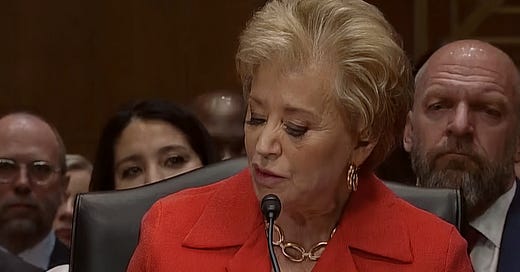Linda McMahon’s Education Overhaul: What It Means for Students and Schools
From School Choice to Federal Cuts: How McMahon’s Vision Could Transform—or Disrupt—American Education
The nomination of Linda McMahon, former CEO of WWE and longtime Trump ally, as Secretary of Education has sparked intense debate over the future of federal education policy. Her confirmation hearing, coupled with former President Donald Trump’s renewed push to dismantle the Department of Education (ED), raises critical questions about how these changes could reshape American education—particularly for vulnerable student populations. Here’s a breakdown of the key issues at stake.
Linda McMahon’s Agenda: Decentralization and School Choice
McMahon’s hearing outlined a clear vision: reduce federal oversight and empower states, parents, and private institutions. Key pillars of her platform include:
State and Local Control
McMahon argued that education decisions should be made “closer to students and families,” not by “Washington bureaucrats.” She pledged to “reorient the department toward helping educators, not controlling them,” signaling a rollback of federal regulations.Expanding School Choice
A staunch advocate of vouchers and charter schools, McMahon framed school choice as a “growing movement” that offers alternatives to “government-run systems.” Critics worry this could divert funding from public schools, while supporters argue it prioritizes parental autonomy.Focus on Vocational Training
McMahon emphasized career-aligned education (STEM fields, apprenticeships) over traditional four-year degrees, stating, “Our workers deserve more post-secondary pathways.” This aligns with growing bipartisan interest in workforce development but raises concerns about underfunding academic programs.Social and Cultural Priorities
McMahon vowed to address anti-semitism on campuses and ban transgender students from female sports and spaces, stating her department would “stop forcing schools to let boys and men into female sports.” She also pledged to protect “parents’ rights to direct the moral education of their children,” echoing conservative critiques of public school curricula.
Trump’s Push to Dismantle the Department of Education
McMahon’s nomination intersects with Trump’s broader agenda to eliminate the ED—a goal he’s pursued since his presidency. Recent developments include:
Executive Action: Draft orders to slash the ED’s budget by $900 million and transfer key functions (e.g., civil rights enforcement) to other agencies.
Legislative Plans: A two-phase strategy to shrink the ED’s role through executive measures first, then push Congress to formally abolish it.
DOGE Involvement: Elon Musk’s cost-cutting “Department of Government Efficiency” (DOGE) has reportedly accessed ED systems, hinting at privatization or tech-driven restructuring.
While abolishing the ED entirely requires congressional approval, Trump’s team claims McMahon’s role is to “put herself out of a job.”
Risks for Students with Disabilities
The ED’s elimination could disproportionately harm students with disabilities, who rely on federal protections under the Individuals with Disabilities Education Act (IDEA). Experts warn:
Weakened Oversight: Moving civil rights enforcement to the Department of Justice might dilute accountability for disability discrimination.
Funding Instability: IDEA funding could become block grants, reducing transparency and equity. States might face pressure to cover gaps, risking service quality.
Data Gaps: The ED’s research on special education best practices could vanish, hindering progress.
Though IDEA would remain law, its implementation could fracture without a dedicated agency advocating for students.
Special Education Funding in the Crosshairs
McMahon’s deregulatory approach and Trump’s budget cuts pose additional threats to special education:
Block Grants: Converting IDEA’s needs-based funding into state block grants might lead to mismatched allocations (e.g., wealthy districts vs. underserved communities).
Agency Shuffling: Transferring IDEA management to Health and Human Services could create bureaucratic delays or misaligned priorities.
Research Cuts: Reduced federal investment in assistive technologies and teacher training could stall innovations for students with disabilities.
Controversies and Challenges
McMahon’s nomination faces scrutiny beyond policy:
WWE Legacy: Lawsuits allege WWE concealed sexual abuse and promoted steroid use during her tenure. Critics question her fitness to oversee student safety.
Partisan Ties: As chair of the pro-Trump America First Policy Institute, McMahon’s loyalty to Trump’s agenda—notably, defunding public education—draws skepticism.
Civil Rights Concerns: Democrats fear she’ll weaken Title IX protections for LGBTQ+ students and sexual assault survivors.
The Path Forward
McMahon’s confirmation hinges on her ability to reassure lawmakers she’ll uphold civil rights and manage the ED’s transition—if it survives. Meanwhile, educators, advocates, and families brace for potential upheaval: Will decentralization empower communities, or deepen inequities? Can states fill the void left by federal retreat?
One thing is clear: The debate over McMahon’s nomination reflects a broader ideological clash about the role of government in education—and its consequences will reverberate far beyond Washington.
What do you think? Should education policy be driven by states or the federal government? Share your thoughts in the comments.
Works Cited
Kingkade, T. (2025). Linda McMahon to face Senate confirmation hearing to be education secretary. [online] NBC News. Available at: https://www.nbcnews.com/politics/congress/linda-mcmahon-senate-confirmation-hearing-education-secretary-rcna191616 [Accessed 14 Feb. 2025].





